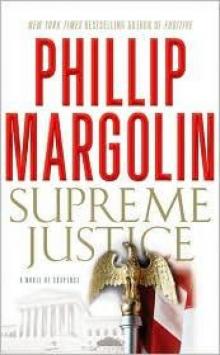Read Supreme Justice Storyline:
From Publishers WeeklyIn this entertaining if predictable sequel to Executive Privilege (2008) from Margolin, policewoman Sarah Woodruff, who's on death row in Oregon, has been tried twice for murdering her lover, John Finley. Sarah's life depends on an appeal to the Supreme Court, but her appeal, if heard, could expose a criminal plot within the CIA. An unexpected vacancy in the court provides one opportunity to quash Woodruff's attempted appeal. For the man at the center of the plot, however, this isn't enough, and a Supreme Court justice becomes a target for assassination. Once again PI Dana Cutler and law clerk Brad Miller find themselves investigating dastardly doings in Washington, D.C., involving a host of conventional characters, from scheming Beltway sachems to a ghetto-raised African-American justice. Thriller fans who like to see the villains receive their just rewards and the good guys come to no harm will find this a comforting read. (June) Copyright © Reed Business Information, a division of Reed Elsevier Inc. All rights reserved. FromMargolin is usually a sure thing, but this sequel to Executive Privilege (2008) is surprisingly weak. Brad Miller, the lawyer who played a key role in bringing down the U.S. president, is now a clerk for a Supreme Court justice. When seemingly unprovoked attacks on two justices appear to be connected to a pending death-row appeal, Brad and several other characters from the preceding novel race against time to get to the truth. For a debut novelist, this would be an adequate first effort. For a genre veteran like Margolin, it reads like a rough draft: thin characters, dialogue that is frequently stilted, and major structural problems (including a flashback sequence, located in the middle of the book, that amounts to a full third of the novel’s length). Devoted fans will look past the novel’s many flaws to enjoy the intricate story, but this is a far cry from Margolin’s excellent early novels, including Gone, but Not Forgotten (1993) and After Dark (1995). --David PittPages of Supreme Justice :
